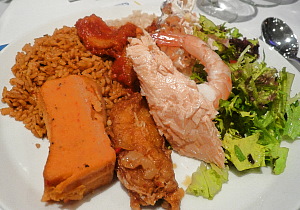About African Food
 Many have wondered: What do Africans eat and what does traditional African food looks like?
Many have wondered: What do Africans eat and what does traditional African food looks like?African foods are plentiful and varied. Rich in dietary fiber and often organic, they present a healthy choice when eaten in the right combination.
African food recipes are centered round a list of ingredients easily found all over the continent. These are natural unrefined food items,easily grown at subsistence farms not far away from home.
African foods are mainly starch based, with generous amount of vegetables and fresh or roasted fish or meat. This means that they are devoid of refined sugars and excess food additives and rich in bulk and fibre. Again, 90% or more of African foods are organic.
These foods are often grown behind the house at subsistence level, helped by the beautiful tropical weather, which means that different varieties of vegetables, fruits, cereals, tubers, nuts, and grains are grown all year round.
Fish, milk, meat from poultry or cow, goat, lamb, or game ("bush meat") as well as other sea foods provide their animal protein in all African communities.
Whether in the bushy savannas, typical rain forest, or coastal riverine settlements, access to such primary source of protein is not in short supply in stable traditional African setting.
There is simply no where in African you would not find farmers, hunters, herdsmen or fishermen...from Yaounde, Sapele, Lagos to Port Alexandria.
Olaudah Equiano, a.k.a Gustavus Vassa (1745 – 31 March 1797), one of the earliest black African writers in the United Kingdom, testified in his narrative, that the traditional African food is free from "refinements in cookery which debauch the taste".
Contrary to what some want the world to belief, the very balanced style of cooking seen in many African communities today has been indigenous to Africa thousands of years even before the slave trade, or even before the incursion of Arabian tradesmen into that continent.
The narrative of Olaudah Equiano (Gustavus Vassa the African), as well as the same preserved manner of cooking still seen in newly found African societies testifies to this fact.
Where ever they went, Africans took along with them their cooking. Thus today, all over the world, Africans still cook alike with some little variations.
Like their Asian counterparts, most cuisines of Africa are quite spicy, prepared with very hot chillies a common trend in most hot countries.
In the West Indies, the afro-Caribbean food is thus not a great deviation from traditional African dishes.
In North America, the African American foods are now generally referred to as soul food. Soul food was thus new to America, but not to the Africans who brought with them the ideas, despite been deprived of the proper ingredients with which to prepare these meals.
Thankfully, soul food is now very popular, and eaten all over black communities in America.
See what African food looks like in specific terms as we take a ride through the various African countries and visit their traditional food stuff in the African foodstuffsection.
The African Dinners
The typical African, whether in a rural farming community or in the bustling city milieu takes great care to see that meals are properly served and eaten. Great attention is also given to how the meals are prepared and what are its constituents.Breakfast is often a must, certainly lunches, and then dinner or supper.
We shall mention briefly here, a few food items eaten by Africans from West of the continent, for breakfast, lunch, and supper as a preview to what the African dinners look like.
African Breakfast
Breakfast is eaten before going to the farm or work place. In farming communities, breakfast is obviously so important to provide energy for the work ahead. Breakfast is often light, and could vary greatly, depending on the part of the continent as well as the culture.
In West Africa, Breakfast food items would include:
- Kunu or millet porridge in Northern Nigeria
- Ogi or maize pap (also called akamu) served with akara also called beans cake in Southern, Western and Eastern Nigeria
- Boiled Yam and plantain, served with fresh fish pepper soup.
Lunch
Lunch is eaten at any time from mid day to 4pm. It is often the heaviest meal of the day. Lunch in Africa is easily prepared from any of the main staples including:
- Cassava products like Gari akpu or starch (usin served with vegetable soup or banga soup or egusi soup or Ofe Onubu.
- Pounded yam or semolina or ground rice (tuwo shinkafa) or corn meal (tuwo masara) or amala made from elubo served with any of the above soups orewedu or abula or gbegiri soup in the south of Nigeria, or Miyan kuka or Miyan kabewa.
- Jollof rice served with moimoi and fried plantain (see picture above).
Supper or Dinner
Supper is eaten any time from 5pm to 10pm in Africa.
It is often a light meal, but can also be a selection of any of the above meals eaten for lunch.
For a full overview of what is eaten at various times and in different parts of the continent, see sections on the respective type of food, or see our recipe section.
If you have never eaten or tried an item of African food before, go for it. It is delicious, refreshing, though could be quite spicy, and certainly nutritious.
Comments about African foods? post them below. You can also post list of African food items eaten in your region, if you did not find it mentioned here.
If you want to succeed you should strike out on new paths, rather than travel the worn paths of accepted success.
ReplyDeleteFlights to Abidjan
Cheap Flights to Abidjan
Cheap Air Tickets to Abidjan